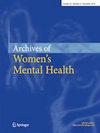The epidemiology of maternal mental health in Africa: a systematic review
Abstract
Background
Despite a growing body of evidence on maternal mental health in Africa, significant gaps remain in understanding its overall landscape, risk factors/determinants, immediate and long-term effects, accessibility to healthcare and services, and availability of practicable/effective interventions. This paper provides a thorough review of both peer-reviewed and grey literature and makes key recommendations and directions for future research and development.
Methods
We systematically reviewed extant evidence using the Preferred Reporting Items for Systematic Reviews and Meta-analyses (PRISMA) 2020 guidelines. Peer-reviewed studies published in English between 2010, and June 2024 were included based on a priori criteria. The National Institutes of Health (NIH) and Critical Appraisal Skill Program (CASP) quality assessment tools were used to critically appraise the reliability, validity and overall quality of included articles. A qualitative narrative synthesis was perfomed to summarize the findings effectively.
Results
A total of 206 full-text articles evaluated for eligibility and inclusion in the systematic review, predominantly observational studies with a minority employing randomized controlled trial (RCT) designs, were included, with 70%, 22%, and 8% of the articles rated as good, fair, and poor quality, respectively. Women in Africa experience a wide range of common perinatal mental disorders, including major depressive disorders and psychosis, either discretely or comorbid. Socioeconomic disadvantages and other intertwined poverty-related factors at the individual, family, social, and environmental levels are implicated in maternal mental health disorders. Currently, there is insufficient evidence regarding the short- and long-term health, development, and social impacts of maternal mental health. Addtionally, there is limited knowledge about the availability and accessibility of mental healthcare, evidence-based context-specific interventions, and healthcare-seeking behaviors of women in Africa, as well as their access to and utilization of mental health services.
Conclusion
The evidence base on maternal mental health in Africa suffers from considerable variability, inconsistency, and equivocal findings resulting from heterogeneity across the studies. This restricts generalizability and the ability to draw valid conclusions. Published studies also likely underestimate the scale and health impacts of perinatal mental disorders. Evidence from these studies are rarely used to inform policies and programs. The maternal mental health ecosystem in Africa needs to be better understood. More rigorous study designs should be implemented to focus on evidence generation and the evaluation of interventions, alongside robust integration of mental health services within health systems. Policy initiatives aimed at reducing socioeconomic disparities in maternal, newborn, and child health, particularly concerning maternal mental health, must be supported by these studies.
Article Highlights
• Women across Africa suffer from various mental health problems, including major depressive disorders, anxiety, and psychosis, occurring separately or in combination.
• The evidence base on maternal mental health in Africa displays significant variability, inconsistency, and ambiguous findings, largely attributed to study heterogeneity.
• Factors at the individual, familial, societal, and environmental levels contribute to poverty-related issues that can lead to or worsen maternal mental health disorders.
• Current evidence has not been synthesized to improve our understanding of the short- and long-term health impacts, developmental consequences, and social implications of maternal mental health conditions, as well as the healthcare-seeking behaviors and access to mental health services.
• Insufficient policy prioritization and funding for maternal mental health in Africa hinder the development, evaluation, and sustainability of interventions.
• There is an urgent need to integrate mental health services into primary healthcare, particularly in resource-limited settings across Africa. This integration should be guided by evidence from rigorous research that uses longitudinal designs. It is also essential to emphasize the importance of investing in digital and community-based approaches to improve the accessibility to mental health services.

 求助内容:
求助内容: 应助结果提醒方式:
应助结果提醒方式:


